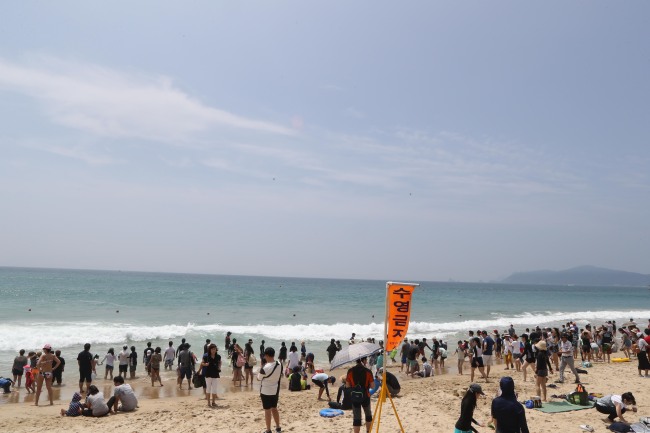Drug components in Busan wastewater rise in summer: study
By Kim Da-solPublished : Aug. 4, 2017 - 15:38
Traces of narcotics found in wastewater in Busan, a coastal city with several beaches that are very popular among South Koreans, show a notable increase during the peak summer vacation season, according to a study released Friday.

According to a team led by Oh Jeong-eun, a professor of environmental engineering at Pusan National University, at least seven kinds of drug components were detected from samples of untreated wastewater from Busan’s three major sewage systems from July to September 2013. One of them directly controls wastewater from popular beaches.
The seven drug components include methamphetamine -- the most common illegal drug in Korea -- codein, meperidine and cis-tramadol, which are normally used in painkillers.
The team calculated the amounts using a method called sewage epidemiology. The daily consumption of meth per 1,000 inhabitants went up to 31.89 milligrams during the peak summer season, about 2.4 times higher than in winter. The amount is equivalent to nearly 2 percent of the average consumption in European countries.
Sewage epidemiology is an analysis method used to obtain direct evidence on how much drugs a community consumes by looking into what is excreted into sewage systems.
The daily consumption of meth per 1,000 inhabitants rose to 31.89 mg in August from 21.20 mg in July, and dropped to 17.88 mg in September as the vacation season ended. The analysis was conducted on three separate occasions. The end of July and the entire of August are the most favored periods for vacation in South Korea.
Previous data from the team showed that the daily consumption of meth per 1,000 inhabitants was 13.10 mg in December 2012.
The team, the first to try sewage epidemiology in Korea, had previously found that 410 kilograms of drugs are consumed every year in Korea, nearly 20 times larger than the amount seized by the prosecution annually.
Their findings were published in the latest issue of Science of the Total Environment, an international scientific journal.
“Drug consumption is not only a serious issue in developed countries but rising as a social problem around the globe. There’s more need to actively make use of sewage epidemiology to prevent drug-related crimes in Korean society,” said Professor Oh who conducted the research.
As of last year, 8,853 people were arrested for drug-related crimes. Nearly 80 percent of the narcotics confiscated by the Korea Customs Service were methamphetamines, according to police.
By Kim Da-sol (ddd@heraldcorp.com)



![[Exclusive] Korean military set to ban iPhones over 'security' concerns](http://res.heraldm.com/phpwas/restmb_idxmake.php?idx=644&simg=/content/image/2024/04/23/20240423050599_0.jpg&u=20240423183955)




![[Pressure points] Leggings in public: Fashion statement or social faux pas?](http://res.heraldm.com/phpwas/restmb_idxmake.php?idx=644&simg=/content/image/2024/04/23/20240423050669_0.jpg&u=)



![[Herald Interview] 'Amid aging population, Korea to invite more young professionals from overseas'](http://res.heraldm.com/phpwas/restmb_idxmake.php?idx=644&simg=/content/image/2024/04/24/20240424050844_0.jpg&u=20240424200058)







